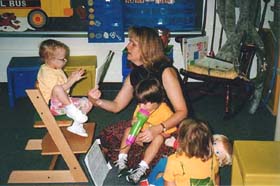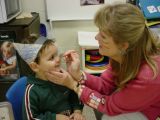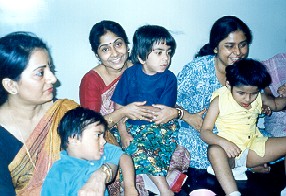ESSE 630:
Teaching Preschoolers with Special Needs

Mission Statement of the Darden College of Education
Old Dominion University's major purpose in its education program is to prepare individuals who have knowledge of their discipline, ability to practice state-of-the-art instruction with students of various cultural and socioeconomic backgrounds, and attitudes which reflect commitment to teaching and learning as well as lifelong professional growth and development.
Course Description
This course is designed to prepare students in curricula, materials and methods of instruction for preschool-aged (2 to 9 years) children with special needs. Programming for self-help, social, language, motor, and cognitive development will be addressed. Data collection, programmatic organization and classroom planning also will be covered.
Course Purpose
The purpose of this course is to prepare professional, competent early childhood special educators who are able to utilize best practices. Students will receive a broad introduction in the materials and methodology used in effective teaching of preschool-aged children with disabilities (2-5 years). The course will stress lesson development, materials adaptation and selection, organization and planning of individual and group instruction as well as major principles of intervention in center-based programs.
Course Competencies
The objectives of this course are aligned with the Council for Exceptional Children's (CEC) standards. The following are the professional standards for Early Childhood Special Educators.
Students will demonstrate mastery of the following knowledge competency areas:
Standard l - Foundations
- Knowledge of historical and philosophical foundations of services for young children with and without exceptional needs.
- Knowledge of trends and issues in ECSE.
- Knowledge of laws and policies that affect young children, families, and programs for young children.
Standard 2 - Development and Characteristics of Learners
- Knowledge of typical and atypical development (2-9 years).
- Knowledge of the significance of socio-cultural and political contexts for the development and learning of young children who are culturally and linguistically diverse.
- Knowledge of common characteristics of major disability conditions in ECSE.
Standard 9 - Professional and Ethical Practice
- Knowledge of organizations and publications relevant to the field of ECSE.
- Participate in activities of professional organizations relevant to the field of ECSE.
Standard 10 - Collaboration
- Knowledge of services and networks for young children with exceptional learning needs and their families.
- Knowledge of team dynamics and practices.
Students will demonstrate the following skills competencies:
Standard 3 - Individual Learning Differences
- Ability to use instructional practices based on knowledge of the child, family, community, and the curriculum.
- Ability to select appropriate instructional strategies for young children.
- Ability to prepare young children for successful transitions.
Standard 6 - Language
- Ability to support and facilitate family and child interactions as the primary contexts for learning and development.
Standard 7 - Instructional Planning
- Ability to implement, monitor, and evaluate Individualized Education Plans (IEPs).
- Ability to plan developmentally and individually appropriate curriculum.
- Ability to design intervention strategies incorporating information from multiple disciplines.
- Ability to use appropriate intervention strategies to facilitate language development/communication in young children.
- Ability to apply principles of learning and child management in early childhood settings.
- Ability to listen reflectively to parents to develop interventions which support
the family's strengths.
- Ability to systematically record and observe behavior of young children.
- Ability to create a learning environment that is responsive to individual child needs and maximizes a child's engagement.
- Ability to develop a trusting, supportive relationship with children that promotes development.
- Ability to structure positive interactions among children of varying levels of ability as well as cultural and ethnic backgrounds.
- Ability to set-up, structure and teach in a classroom which follows best practice in ECSE.
Standard 8 - Assessment
- Ability to assist families in identifying their concerns and priorities.
- Ability to respect family choices and goals.
- Ability to apply team process in ECSE.
Standard 9 - Professional and Ethical Practice
- Ability to advocate for enhanced professional status and working conditions for each childhood service providers.
- Ability to apply research and effective practices critically in early childhood settings.
- Ability to develop, implement, and evaluate a professional development plan relevant to one's work with young children.
- Development of a set of attitudes and practices that will enable students to join and become contributing members of a community of professional special educators.
Standard 10 - Collaboration
- Ability to assist families in planning transitions.
- Ability to communicate effectively with families about curriculum and their child's progress.
- Ability to apply various models of consultation in early childhood settings.
- Ability to recognize one's limitations and to seek assistance/support when appropriate.




